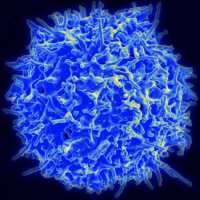The Cancer Survivors Network (CSN) is a peer support community for cancer patients, survivors, caregivers, families, and friends! CSN is a safe place to connect with others who share your interests and experiences.
My newest challenge

Well, I spent the weekend in the hospital. I've had a dry cough, on and off fever, fatigue and shortness of breath, for about 3 weeks. Had a chest x-ray that showed a few spots in my lungs.. LDH jumped from 175 to 429 during that 3 weeks. WBC dropped to 1.9. Had a chest, abdomen and pelvis CT. it showed the spots/haze in my lungs, nothing else, but the radiologist, oncologist, pulmonologist and PCP all believe it is not related to Lymphoma. They called my stem cell team to see if there could be a reaction to meds, but they said no, there's been enough time. Infectious disease doc thought maybe pneumocystis??? All guesses at this point. I do feel better than 10 days ago.
Had all kinds of tests for viruses, pneumonia's, flu,fungus, etc,etc, so far negative. Path isn't back yet on the lung biopsy from the bronchoscopy.
i asked every doc I came across if it looked like Lymphoma or cancer and all agreed no, well not 100%, no because I don't think they can Say it 100%without biopsy results and I know with a bronchoscopy the sample is tiny. they put me on prednisone and Bactrim.
LDH scares me. Quite a jump in 3 weeks. In real life does LDH rise with unknown inflammation? Of course my mind is not at ease!
Sharon
Comments
-
LDH is tissue breakdown for various reasons
LDH relates to any sort of tissue breakdown - hard exercise can raise it. Well, since I am currently fighting HRSV (Human Respiratory Syncytial Virus), I found out the hard way it can produce those symptoms, except no fever in my case. Combine it with Rhino virus and pneumonia and I was blessed to stay out of the hospital. Regarding LDH, from the Wiki: "Noncancerous conditions that can raise LDH levels include heart failure, hypothyroidism, anemia, pre-eclampsia, meningitis, encephalitis, acute pancreatitis, HIV and lung or liver disease. Tissue breakdown releases LDH, and therefore LDH can be measured as a surrogate for tissue breakdown, e.g. hemolysis. LDH is measured by the lactate dehydrogenase (LDH) test (also known as the LDH test or lactic acid dehydrogenase test). Comparison of the measured LDH values with the normal range help guide diagnosis."
It's always something!
Discussion Boards
- All Discussion Boards
- 6 Cancer Survivors Network Information
- 6 Welcome to CSN
- 122.7K Cancer specific
- 2.8K Anal Cancer
- 457 Bladder Cancer
- 313 Bone Cancers
- 1.7K Brain Cancer
- 28.6K Breast Cancer
- 407 Childhood Cancers
- 28K Colorectal Cancer
- 4.6K Esophageal Cancer
- 1.2K Gynecological Cancers (other than ovarian and uterine)
- 13.1K Head and Neck Cancer
- 6.4K Kidney Cancer
- 685 Leukemia
- 805 Liver Cancer
- 4.2K Lung Cancer
- 5.1K Lymphoma (Hodgkin and Non-Hodgkin)
- 243 Multiple Myeloma
- 7.2K Ovarian Cancer
- 71 Pancreatic Cancer
- 493 Peritoneal Cancer
- 5.7K Prostate Cancer
- 1.2K Rare and Other Cancers
- 544 Sarcoma
- 744 Skin Cancer
- 662 Stomach Cancer
- 194 Testicular Cancer
- 1.5K Thyroid Cancer
- 5.9K Uterine/Endometrial Cancer
- 6.4K Lifestyle Discussion Boards
